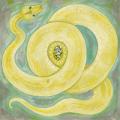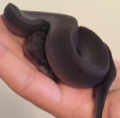» Site Navigation

1 members and 1,658 guests
Most users ever online was 47,180, 07-16-2025 at 05:30 PM.
» Today's Birthdays

» Stats

Members: 75,917
Threads: 249,118
Posts: 2,572,207
Top Poster: JLC (31,651)
Welcome to our newest member, Necbov
|
-
Registered User


Re: Is keeping snakes humane?
 Originally Posted by kiiarah

I think it would be fascinating to observe what differences, if any, they have in behavior when compared to their CB relatives. Do you suppose they would be just as docile as the ones found in the pet trade?
I think so. I think a snappy baby wild ball python would mellow out just like a snappy CB baby does. Aside from the paint, I don't think we've done anything to change the animal.
-
-
Registered User


Re: Is keeping snakes humane?
 Originally Posted by Snake Judy

I think so. I think a snappy baby wild ball python would mellow out just like a snappy CB baby does. Aside from the paint, I don't think we've done anything to change the animal.
False. Are goldfish bred for temperament? How are they considered domesticated and not a ball python. They will never be considered domesticated because most people do not like/appreciate reptiles. And I have friends who buy captive hatched ball pythons from Africa to get dinkers and 3/4 of the clutch is snappy and hissy usually. I dealt with picking through many captive bred clutches from friends and the temperament difference is very noticeable from captive hatched babies from Africa. I don't know but I read somewhere that offspring from boas and pythons of all kinds that have genes farther away from the first generation bred animals are likely to be more calm. It is like the start of domestication for reptiles who are more commonly bred.
-
-
Re: Is keeping snakes humane?
 Originally Posted by Snake Judy

Are any snake breeders really looking at temperament when pairing animals, though? It seems to me like it's low on the priority list, but I'm not in the breeder circuit so I don't really know if that's being taken into consideration. Is there really a notable difference between a captive hatched python and a captive bred one? The placid nature of ball pythons is one of the things that made them so popular in the pet trade in the first place. I don't think that can be called domestication.
It's low on the priority list for ball pythons since a nip from one typically won't send you to the ER. They are bred, purchased, and sold for their paint jobs not their attitudes.
OTOH people keeping the larger snakes are more likely to keep and breed the mellower critters, simply because they don't care to deal with a 15-20 foot snake that wants to rip off your face every day.
-
The Following 2 Users Say Thank You to bcr229 For This Useful Post:
GoingPostal (07-12-2015),se7en (07-12-2015)
-
Registered User


Re: Is keeping snakes humane?
 Originally Posted by 8_Ball

False. Are goldfish bred for temperament? How are they considered domesticated and not a ball python.
The domestication of goldfish dates back to the Song dynasty (960-1279 AD) or earlier. It is a completely different animal from its wild carp ancestors.
You are confusing domestic with tame/docile.
We are starting to make changes to ball pythons. Colour morphs, scaleless, etc. But it has been a couple of decades, not centuries like most other animals we consider domestic.
-
-
Domestication doesn't really refer to temperament so much as a definable change in genetics from the wild ancestors, typically to the point that the domesticated animal is no longer classed as the same species but usually as a separate species or subspecies. In some cases these differences manifest as a difference in temperament (such as with dogs and horses) but it can also manifest as differences in build (such as in livestock bred for meat) or appearance (such as goldfish bred for ornamentation). Captive snakes have a variety of paint jobs that might not do so well in the wild, but that's not really enough of a difference to qualify as domestication.
3.0 Thamnophis sirtalis,
1.1 Thamnophis cyrtopsis ocellatus
0.1 Python regius
1.0 Litorea caerulea
0.1 Ceratophrys cranwelli
0.1 Terrapene carolina
0.1 Grammostola rosea
0.1 Hogna carolinensis
0.0.1 Brachypelma smithi
-
-
Re: Is keeping snakes humane?
I thought looking up the dictionary definition of "domestication" re. animals might help clarify. Unfortunately, the definition seems pretty loose - more or less, bringing in animals to live under human care for what ever purpose. (I don't have a paper dictionary handy to get anything better.) The scientists on the forum might have a more specific definition that the rest of us are not working from.
One thought about BP's vs Gold fish: We have the benefit of Mendelian genetics as a model for what we are doing. Did the Chinese have any working model? Maybe the BP morphs have expanded relatively recently is simply because the process of breeding morphs is now well understood?
-
-
Re: Is keeping snakes humane?
 Originally Posted by distaff

One thought about BP's vs Gold fish: We have the benefit of Mendelian genetics as a model for what we are doing. Did the Chinese have any working model? Maybe the BP morphs have expanded relatively recently is simply because the process of breeding morphs is now well understood?
I'm not up on ancient Chinese history, but they were very scientifically advanced for the time. They may not have had the Mendelian model, but there was almost certainly some understanding of how traits were passed on.
I think the primary difference is in the SORT of mutations that captive BPs display, as opposed to those seen in goldfish. It's taken hundreds of years, but the majority of goldfish have mutations that far exceed the 'paint job' mutations that we encourage in BPs. They are MUCH smaller than their carp ancestors, and things such as bulging and displaced eyes, doubled tails and fins, truncated bodies, ect. are commonplace. Much different than just an oddly colored carp. If in a few hundred years all or most captive BPs had two tails and were a foot long, you could probably make the argument that they were domesticated, but as it is they are genetically indistinguishable from their wild counterparts (the mutations we deal with are a very small part of the overall code).
Generally, speciation occurs when physical, behavioral, temporal, or spatial barriers prevent two species or subspecies from interbreeding regularly. A typical pet store goldfish cannot breed with a carp. Behavioral and physical differences prevent widespread interbreeding of dogs and wolves (yes, it happens occasionally, but it is far more likely that a fight would break out, and a wolf cannot physically breed with, say, a chihuahua). Temporal pollination differences and polyploidy prevent many 'domesticated' plant species from pollinating their wild counterparts. Stick a wild BP with a captive one, and none of these things will prevent them from breeding successfully.
3.0 Thamnophis sirtalis,
1.1 Thamnophis cyrtopsis ocellatus
0.1 Python regius
1.0 Litorea caerulea
0.1 Ceratophrys cranwelli
0.1 Terrapene carolina
0.1 Grammostola rosea
0.1 Hogna carolinensis
0.0.1 Brachypelma smithi
-
-
Re: Is keeping snakes humane?
That is part of what I find interesting. The BP's have proven variable for color and pattern, but the body types seem identical. I don't see size, shape, or behavior differences. Compare that to the various breeds of dogs, pigeons, chickens... The BP has so far been remarkably stable for everything BUT color and pattern.
I am curious what drives the genetics in gold fish. You are correct about the morphs being so much more extreme - even, really, for other animal categories. No one has come up with a pigeon that has bulging enormous eyes that only face up. We have pouty full-breasted pigeons, but no hunchbacked pigeons with enormous trailing tails and fleshy wens growing over their foreheads. Gold fish morphs really are extraordinary.
-
-
Re: Is keeping snakes humane?
 Originally Posted by distaff

That is part of what I find interesting. The BP's have proven variable for color and pattern, but the body types seem identical. I don't see size, shape, or behavior differences. Compare that to the various breeds of dogs, pigeons, chickens... The BP has so far been remarkably stable for everything BUT color and pattern.
I am curious what drives the genetics in gold fish. You are correct about the morphs being so much more extreme - even, really, for other animal categories. No one has come up with a pigeon that has bulging enormous eyes that only face up. We have pouty full-breasted pigeons, but no hunchbacked pigeons with enormous trailing tails and fleshy wens growing over their foreheads. Gold fish morphs really are extraordinary.
I think you have to take into account that snakes with traits like that are generally either culled or not allowed to breed. Also, the amount of time we've been working with BPs is incredibly small (about 40 years; just long enough that the first ones brought into the hobby are aging out) compared to centuries for even the most recently domesticated animals like goldfish. Thousands of years for things like dogs and horses.
As for the pigeons, I think the chicken is probably a good example. They come from similar ancestors, but look at what we've done to the chicken which we domesticated for meat and egg production, as opposed to the pigeon, which for the majority of the time they've been captive, was used primarily as a message courier; so really the 'default model' that could fly long distances and had coloration to avoid predators was perfect-- no need to modify that.
3.0 Thamnophis sirtalis,
1.1 Thamnophis cyrtopsis ocellatus
0.1 Python regius
1.0 Litorea caerulea
0.1 Ceratophrys cranwelli
0.1 Terrapene carolina
0.1 Grammostola rosea
0.1 Hogna carolinensis
0.0.1 Brachypelma smithi
-
-
Registered User


Re: Is keeping snakes humane?
 Originally Posted by distaff

You are correct about the morphs being so much more extreme - even, really, for other animal categories. No one has come up with a pigeon that has bulging enormous eyes that only face up. We have pouty full-breasted pigeons, but no hunchbacked pigeons with enormous trailing tails and fleshy wens growing over their foreheads. Gold fish morphs really are extraordinary.
On the topic of extreme pigeons, take a look! http://www.mnn.com/earth-matters/animals/stories/18-most-bizarre-pigeon-breeds
If people started selecting their breeding snakes for size, or for particular traits, like big eyes, or long noses, or ability to slither more quickly, who knows what we'd end up with! Probably nothing that would particularly benefit the animal, but artificial selection rarely does. Those goldfish with bulging eyes and huge, trailing fins can hardly function.
Anyway, that's a bit off topic I guess. But the distinction between domestic and wild is sort of important, because since captive bred snakes are no different, genetically or physiologically, from their wild counterparts, it means that their care should be modeled closely on their natural environment and behavior.
-
 Posting Permissions
Posting Permissions
- You may not post new threads
- You may not post replies
- You may not post attachments
- You may not edit your posts
-
Forum Rules
|